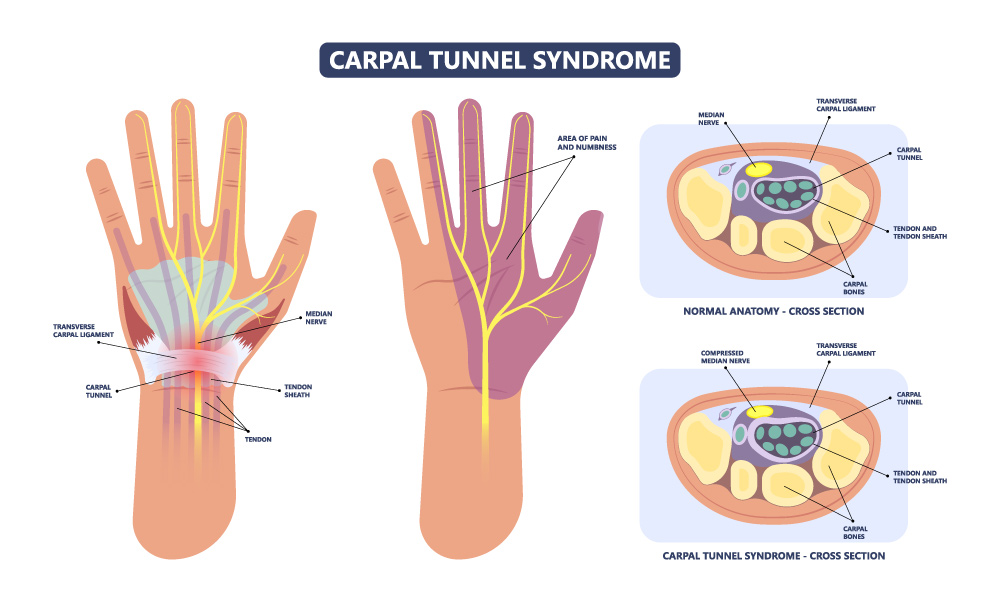Carpal tunnel syndrome (CTS) is one of the most common nerve compression conditions affecting the hand and wrist. It can cause symptoms ranging from tingling and numbness to persistent pain and weakness, often disrupting work, sleep and day-to-day activities. If you’re experiencing signs of CTS, you may be wondering: ‘Do you need surgery for carpal tunnel syndrome’ — or are there other treatment options worth exploring first?
In this latest blog post, we explore the full range of carpal tunnel treatment options (both surgical and non-surgical) and highlight when surgery may be considered the most effective course of action. Whether your symptoms are recent or ongoing, understanding your options can help you make informed decisions about your hand and wrist health.
Understanding Carpal Tunnel Syndrome
Carpal tunnel syndrome develops when the median nerve, which runs through a narrow passage in the wrist (the carpal tunnel), becomes compressed. This can be due to inflammation, repetitive wrist motion, or underlying health conditions.
Symptoms may start gradually and worsen over time, particularly during activities that involve gripping or prolonged wrist flexion. If left untreated, CTS can lead to permanent nerve damage and loss of hand function. That’s why early diagnosis and tailored treatment are important.

Carpal Tunnel Treatment Options Without Surgery
In many cases, particularly where symptoms are mild or intermittent, non-surgical approaches can help manage the condition. These may include:
- Wrist splinting: Wearing a wrist splint at night or during repetitive tasks can help keep the wrist in a neutral position, reducing pressure on the median nerve.
- Activity modification: Adjusting wrist-intensive tasks, taking regular breaks and improving ergonomics can prevent symptom flare-ups.
- Anti-inflammatory medication: Non-steroidal anti-inflammatory drugs (NSAIDs) may relieve discomfort and reduce swelling around the nerve.
- Corticosteroid therapy: A temporary option, corticosteroid treatment can reduce inflammation and stabilise the nerve membranes, but its benefits may be short-lived in more advanced cases.
- Hand therapy: A programme of guided stretching, gliding and strengthening exercises may be recommended to support overall wrist and hand function.
For those with early-stage or fluctuating symptoms, these options can offer temporary relief. However, if symptoms persist or return despite conservative care, further intervention may be needed.
When to Consider Carpal Tunnel Surgery
So, when is carpal tunnel surgery necessary? If you’re finding that symptoms are interfering with sleep, hand strength, or your ability to carry out routine tasks, it may be time to consider more definitive treatment.
Surgery is typically recommended when:
- Non-surgical treatments have failed to control symptoms
- Symptoms have persisted for six months or more
- There signs of muscle weakness, muscle wasting or hand function has worsened
- Nerve testing confirms significant ongoing compression or damage
Early surgical intervention may help prevent irreversible nerve damage and restore hand function more effectively than prolonged conservative care.

Surgical Options for Carpal Tunnel Syndrome
There are two main types of carpal tunnel surgery:
Open carpal tunnel release
This traditional method involves a small incision in the palm to divide the transverse carpal ligament, relieving pressure on the median nerve. It allows the surgeon direct access and is often used in more severe or advanced cases.
Endoscopic carpal tunnel release
A less invasive option, this technique uses a thin tube with a camera to guide the release through one or two small incisions. It typically results in smaller scars and may support a faster return to normal activities.
Ultra-Sonographic assisted percutaneous carpal tunnel release
Ultra-Sonographic assisted percutaneous carpal tunnel release Ultra-sonographic surgery, a percutaneous technique with the addition of ultrasound visualization, is another new technique that is showing promising results, with no wounds requiring stitches, and a faster recovery time.
Both procedures are typically performed as day cases under local anaesthetic, with minimal disruption to daily life. At UK Hand and Wrist Surgery, carpal tunnel release is carried out by Mr Patrick Goon, a specialist hand and wrist surgeon. His surgical expertise ensures a tailored approach, with a strong focus on safety, precision and long-term symptom relief.
Benefits of Surgical Treatment
Surgery is often the most effective long-term solution for those with moderate to severe carpal tunnel syndrome. Benefits may include:
- Resolution of pain, numbness and tingling
- Restoration of hand strength and grip
- Prevention of permanent nerve damage
- Return to normal function, including work and daily activities
While all surgery carries some risk, complications from carpal tunnel release are rare when performed by an experienced hand surgeon. Most patients report significant improvement in symptoms within a few weeks.
Making the Right Decision for You
Choosing between non-surgical and surgical treatment for carpal tunnel syndrome depends on the severity and duration of your symptoms, your overall health and your personal goals. While some cases can be managed without surgery, others may benefit from timely surgical intervention to avoid long-term issues.
If you’re unsure whether surgery is the right next step, booking a consultation with a specialist like Mr Goon can help you understand your options. At UK Hand and Wrist Surgery, our approach is always personalised, whether you’re seeking a second opinion or exploring surgery for the first time.
Book an Appointment with Mr Goon
If you are suffering from a hand or wrist problem, please use the online form to contact us and arrange an appointment with Mr Goon. Alternatively, you can call us on 07355 571488.
FAQs
How do I know if I need surgery for carpal tunnel?
Surgery is often recommended when symptoms persist despite non-surgical treatment or when nerve tests show signs of compression. If hand weakness or disrupted sleep becomes a regular issue, it’s worth discussing surgical options with a specialist.
What are the alternatives to carpal tunnel surgery?
Non-surgical options include wrist splints, activity changes, hand therapy and anti-inflammatory medication. These approaches may be effective for clients with early or mild symptoms.
What happens if carpal tunnel is left untreated?
Without treatment, ongoing nerve compression can lead to permanent damage and reduced hand function. This may include muscle weakness, loss of coordination, or persistent numbness.
How long is the recovery time for carpal tunnel surgery?
Most clients resume light daily tasks within a few days of surgery, with full recovery expected in 4 to 6 weeks. Recovery can vary depending on the severity of symptoms and the surgical technique used.
Do I need surgery for carpal tunnel if symptoms are mild?
Mild symptoms can often be managed with non-invasive treatments and regular monitoring. However, worsening symptoms may indicate the need for surgical review.
What is the success rate of carpal tunnel surgery?
Carpal tunnel surgery has a high success rate, with most clients experiencing long-term relief from pain, numbness and tingling. Choosing an experienced hand surgeon can support better outcomes.









